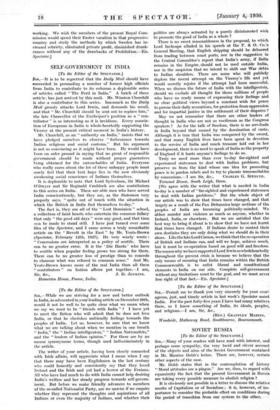SELF-GOVERNMENT IN INDIA [To the Editor of the SPECTATORJ
is to be regretted that the Daily Mail should have succeeded in persuading a number of former high officials from India to contribute to• its columns a deplorable series of articles called "The Peril in India." A batch of these article ; has just arrived by this mail. Mr. Winston Churchill is also a contributor to this series. Inasmuch as the Daily Mail grossly attacks Lord Irwin, and demands his recall, and that "Mr. Churchill should be sent out to replace him," the late Chancellor of the Exchequer's position as a " con- tributor " is as interesting as it is invidious. Every associa- tion of Europeans in India is whole-heartedly supporting the Viceroy at the present critical moment in India's history.
Mr. Churchill, as an "authority on India," insists that we have pledged ourselves to observe "forbearance towards Indian religious and social customs." But his argument is not as convincing as it might have been. He would have been on safer ground in saying that no grant of responsible government should be made without proper guarantees being obtained for the untouchables of India. Everyone who really cares about the lot of these unhappy people must surely feel that their best hope lies in the now obviously awakening social conscience of Indians themselves.
It is deplorable to note that Lord Sydenham, Sir Michael O'Dwyer and Sir Reginald Craddock are also contributors to this series on India. These are able men who have served India conscientiously, but they are, as the Statesman very properly says, "quite out of touch with the situation in which the British in India find themselves to-day."
The fact is, they are all of the "Lost Dominion" school, a collection of faint hearts who entertain the common fallacy that only "the good old days" were any good, and that time can be made to stand still. I have just turned over some files of the Spectator, and I came across a truly remarkable article on the "Revolt in the East" by Mr. Yeats-Brown (Spectator, February 12th, 1927). He very wisely wrote : "Concessions are interpreted as a policy of scuttle. There can be no greater error. It is the 'Die Bards' who have to scuttle when popular feeling grows too strong for them, There can be no greater loss of prestige than to concede to clamour what was refused to common sense." And Mr, Yeats-Brown knows more of the real India than all these 4.,` contributors " on Indian affairs put together.—I am, Sir, &c., J. D. JENKINS. . Hamerlon House, Poona, India.










































 Previous page
Previous page